Dictionary
There are certain terms we use that you may not be familiar with. The following are some common terms and their definitions.
A gift of the Holy Spirit, granted to a person or persons for the common good of the Church; it is proper to speak of the charism of the founders and the spirit of the Company
A term referring to the Daughters of Charity; St. Vincent de Paul and St. Louise often referred to the early Daughters as the “Company” or “Little Company”
Groups of women who joined together as Ladies of Charity to serve the poor in an organized manner
The process of prayerful reflection to discover where God is leading
The Daughters of Charity give great importance to both initial and ongoing formation, in order to strengthen and energize the Sister in her vocation, to offer quality service to those who are poor, and to know and discern the signs of the time. Formation allows the Sister to live her vocation as a progressive modeling of herself in Christ, with renewed fidelity to the Spirit and to the aim of the Company.
Formation at all levels has as its goal, above all, the growth of each Sister in faith so that, animated by the Holy Spirit and the charism of the Founders, she becomes capable of:
- Acquiring convictions that strengthen and unify her total gift of self to God
Being a servant of Christ in the poor and the poor in Christ, in a spirit of humility, simplicity and charity - Living a life in common for mission (Constitutions and Statutes of Daughters of Charity of St. Vincent de Paul, C. 49)
The preferred term in the Latin rite for the official liturgical prayers sanctifying the parts of each day; the Daughters of Charity pray the morning and evening prayers as part of their prayer ritual (Catholic News Service Stylebook on Religion, 1990)
The primary place of belonging for Daughters of Charity; community living fosters among them a sharing that extends not only to material conditions but also to spiritual and apostolic commitments: in dialogue, experiences are shared, differences are minimized, decisions are sought together (Constitutions and Statutes of Daughters of Charity of St. Vincent de Paul, C. 34)
The stage during which the candidate experiences living a spiritual, community, and apostolic life in common; she continues to discern her vocation and deepen her human and Christian formation.
In the light of the Gospel, she seeks to discover the Vincentian charism and learn the requirements of her vocation as expressed in the Constitutions and Statutes. During this stage, the Postulant is assisted particularly by the Sister Servant and local community in coordination with the Sisters responsible for Postulancy. She is admitted to the Seminary when both she and the Company are morally certain she is called by God and is ready to take upon herself the life of a Daughter of Charity (Constitutions and Statutes of Daughters of Charity of St. Vincent de Paul, C. 54)
A time specifically reserved for vocational discernment; the purpose is to help a woman ask if God is calling her to religious life and it is characterized by a deepening of her Christian life and approach to the life of the Daughters of Charity
The Sisters of a particular geographic region in the world comprise a province. There are approximately 100 provinces of Daughters of Charity in the world. Each is overseen by a Visitatrix and Provincial Council.
1. Characterized by adherence to religion or a religion; devout, pious, godly 2. Of, concerned with, appropriate to, or teaching religion 3. Belonging to a community of monks, nuns, etc. (Webster’s New World Dictionary)
Enables a Daughter of Charity to intensify her theological life, to integrate the values if service, total gift of self to God, community living, and to familiarize herself with the practice of the evangelical counsels in a “state of charity”; similar to what other communities call a novitiate.
During this stage, the Sister strives to cultivate evangelical discernment and to acquire sufficient knowledge of the Constitutions and Statutes. In a spirit of recollection, prayer and Christian asceticism, as well as through apostolic activities and periods of apostolic experience in a local community, she becomes imbued with the spirituality of the Founders. She is supported by an intensive liturgical life and an atmosphere of simplicity and friendship.
The Seminary Directress, assisted by other formators, has the primary responsibility for formation during this period.
At the end of Seminary, the duration of which is a minimum of 12 months, excluding the periods of apostolic experience, the young Sister submits to the Visitatrix, in writing, her request for her “sending on mission” (Constitutions and Statutes of Daughters of Charity of St. Vincent de Paul, C. 56).
Defined in Canon Law as “an Institute whose members, without religious vows, pursue their proper apostolic purpose and, leading a life in common, strive for the perfection of charity through the observation of their Constitutions. Among these are societies in which members assume the evangelical counsels by some bond defined by their Constitutions.”
A sacred promise or commitment made publicly with the approval of the Church. Through her vows, a Sister responds with her whole life to God’s invitation to love Him completely and without reserve. This free response is a fuller expression of her baptismal call and is, for one who is genuinely called to the consecrated life, a means to greater holiness. Ratifying the gift of self to God; Daughters of Charity make four vows: poverty, chastity, obedience and service of the poor; the vows are annual and nonreligious
Known in other communities as Provincial or Superior; sister to leads a province of Daughters of Charity
People & Places
There have been many significant people and places throughout our history. The following are some of the most important to know.
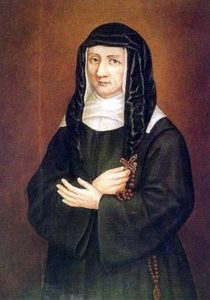 (1591-1660) Co-founder of the Daughters of Charity; proclaimed “Patroness of all those who devote themselves to Christian social works"
(1591-1660) Co-founder of the Daughters of Charity; proclaimed “Patroness of all those who devote themselves to Christian social works"
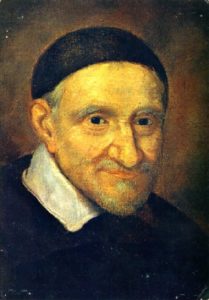 (1581-1660) Co-founder of the Daughters of Charity; proclaimed “Universal Patron of works of charity”
(1581-1660) Co-founder of the Daughters of Charity; proclaimed “Universal Patron of works of charity”
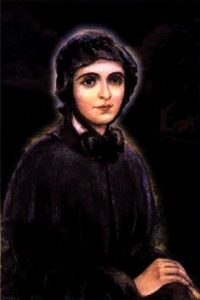 (1774-1821) The first native-born American saint; founded the Sisters of Charity of St. Joseph’s in Emmitsburg, Maryland; in 1850, this American community was united with the Company of the Daughters of Charity
(1774-1821) The first native-born American saint; founded the Sisters of Charity of St. Joseph’s in Emmitsburg, Maryland; in 1850, this American community was united with the Company of the Daughters of Charity
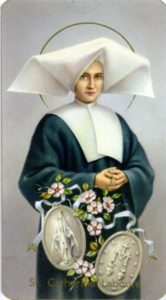 (1806-1876) Daughter of Charity favored with the apparition of the Blessed Mother who asked her to create the Miraculous Medal
(1806-1876) Daughter of Charity favored with the apparition of the Blessed Mother who asked her to create the Miraculous Medal
The name first given to the community founded by Elizabeth Ann Seton
The Daughters of Charity Motherhouse is located at 140 Rue du Bac in Paris, France; it is there the Chapel of Our Lady of the Miraculous Medal is located
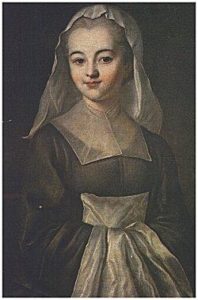 (1594-1633) The first Daughter of Charity
(1594-1633) The first Daughter of Charity
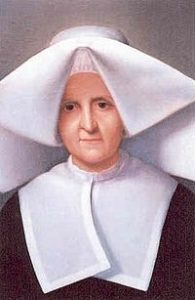 (1786-1856) Daughter of Charity recognized for her dedication to the poor during the Industrial Revolution
(1786-1856) Daughter of Charity recognized for her dedication to the poor during the Industrial Revolution
Have more questions? Get in touch!
